
Diagnosing Air Compressor Vibration Issues: Tips for Technicians
December 18, 2024
Top Ten Compressed Air Fixes That Power Sustainable Manufacturing Practices
January 1, 2025How Air Compressors Aid in Reducing Factory Noise Pollution
Kaishan USA | December 25, 2024| Uncategorized
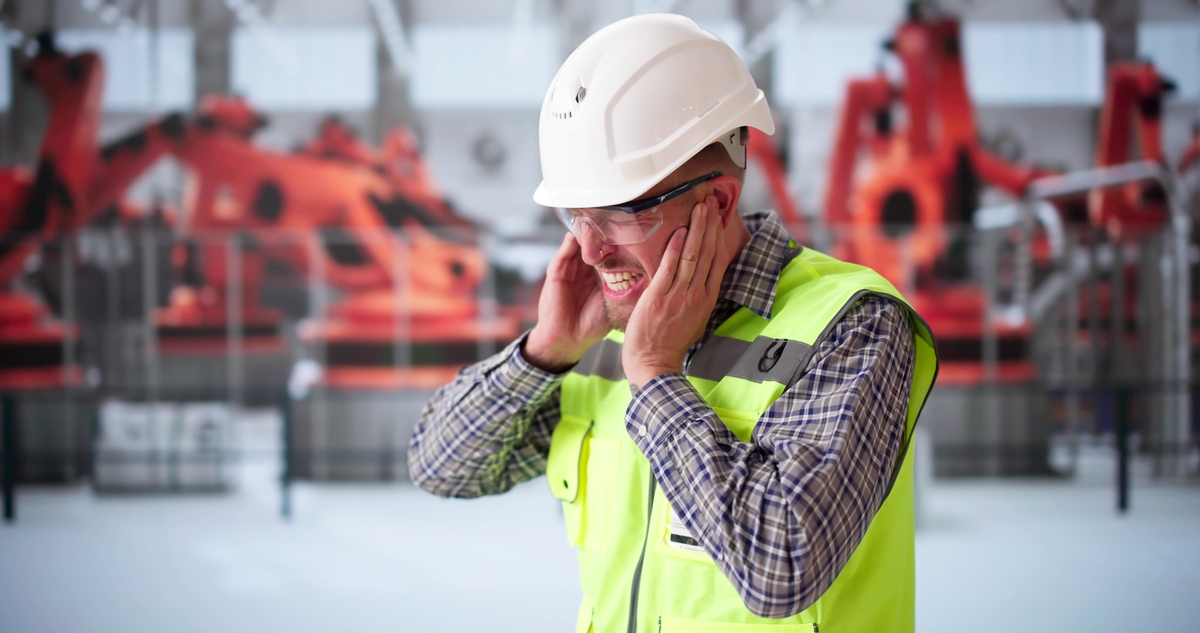
Factory noise reduction can create a more comfortable working environment and significant bottom-line benefits for your business.
Sound has always been an issue with compressed air, with some types of compressors, notably reciprocating compressors, being notoriously noisy.
It’s a growing concern for a variety of reasons. There are regulatory pressures, of course. And deafening sound levels create a hostile environment for workers. And there’s so much that can be done to address the issue.
So, let’s start with the basics of industrial noise pollution: the issues just mentioned.
The Health and Wellbeing of Your Employees
It’s not just that loud compressors make your workers uncomfortable. They also create the following issues:
- Hearing loss. More than 20% of Americans (48.1 million people) experience hearing loss in at least one ear, according to the Journal of the American Medical Association. A portion of that hearing loss comes from job-related exposure to noise.
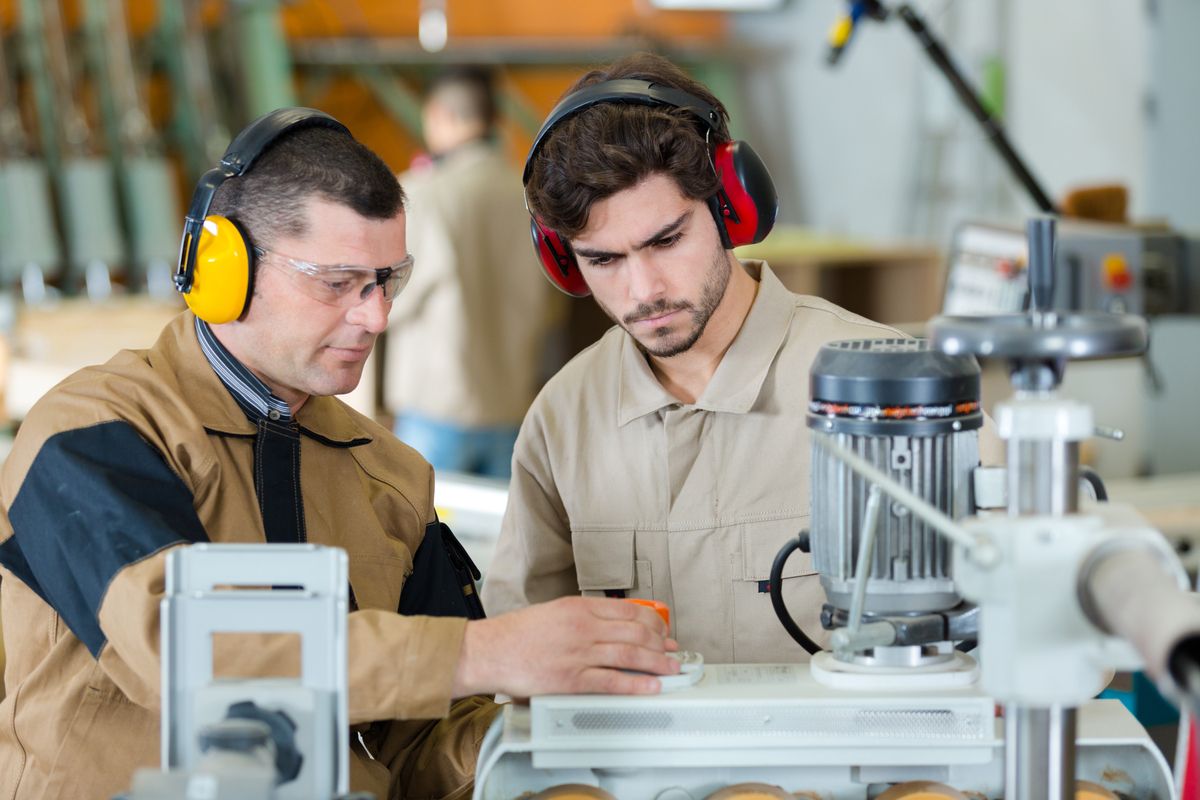
Factory noise can make communications difficult on the factory floor.
- Stress. Noise contributes to many other workplace problems, according to the U.S. Occupational Safety and Health Administration (OSHA), impeding communications, increasing stress, interfering with concentration and making it difficult to hear warning signals.
- Lower job satisfaction. And, hence, greater turnover. We’ve wondered how some workers keep their sanity when exposed to noise for a full shift.
- Communications. Many times, we’ve been in plants where you had to wait for a compressor to cycle down before you could speak to the equipment operator. That’s inconvenient, and it’s unsafe.
Is lowering the noise level in a factory a game-changer? Probably not. But it shows workers that somebody cares about them and is looking out for their welfare.
And there’s also our job satisfaction. For us, there’s nothing better than hearing a customer say, “I have to actually put my hand on them to make sure they’re running.”
Business Concerns
Beyond caring for employees, there are some important business issues.
First, OSHA points out that concentration suffers in noisy environments. And poor communications present significant safety and productivity issues. If you can’t communicate with someone, or if they can’t hear alarms, it slows them down. Productivity takes a hit, and it’s an accident waiting to happen.
Second, noise and vibration are often the first indication that something is wrong with your compressed air system. Along with alarms, noise and vibration may indicate more significant problems. Thus, you should not ignore them. For more on the importance of these early indicators, read our blog post, “Diagnosing Air Compressor Vibration Issues: Tips for Technicians.”
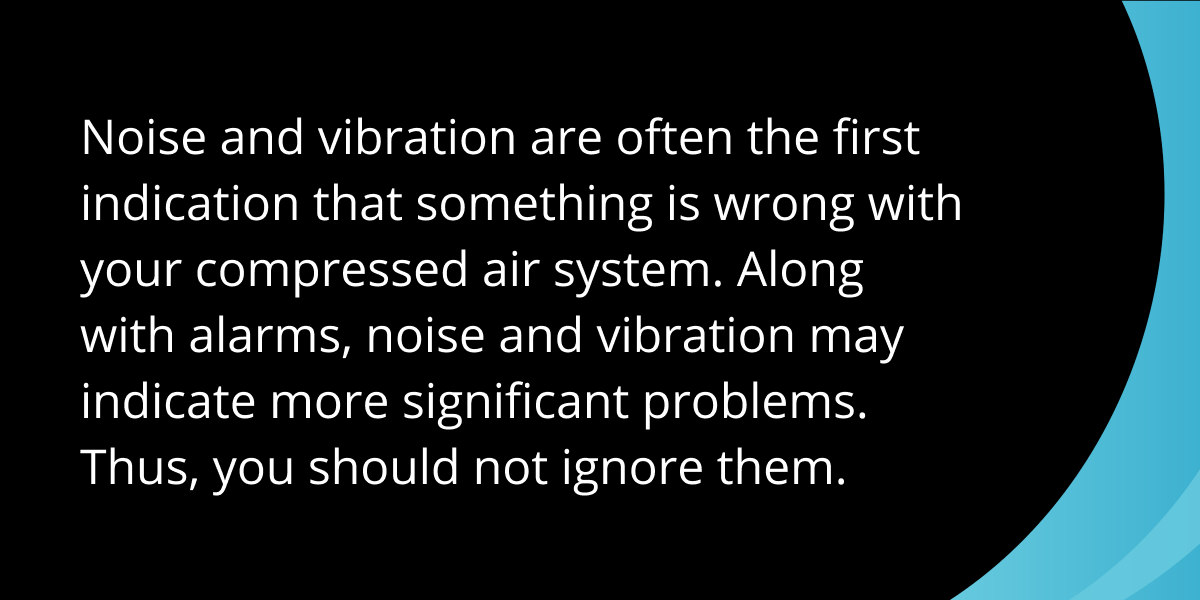
Third, the noise level may not pass muster in an OSHA inspection. Or worse, your company could potentially face liability claims in the event of an accident.
So, what are the rules?
The Rules and How Compressors Stack Up
The U.S. Centers for Disease Control and Prevention (CDC)’s National Institute for Occupational Safety and Health (NIOSH) has established its Recommended Exposure Limit (REL) for noise as 85 decibels.
OSHA noise standards establish a 90-dB limit for eight hours of exposure.
Fortunately, most compressors sold today comply with the guidelines, falling in the range between 40 dB and 92 dB. Almost every air compressor commercially available on the market now meets the REL threshold.
Unfortunately, that’s not enough. Compressors don’t exist in a vacuum (pun intended). They power other applications, from nail guns to torque wrenches, that also raise the sound level in the factory. Therefore, a compressor’s 70 or 80 decibels are in addition to the noise already being generated in your factory.
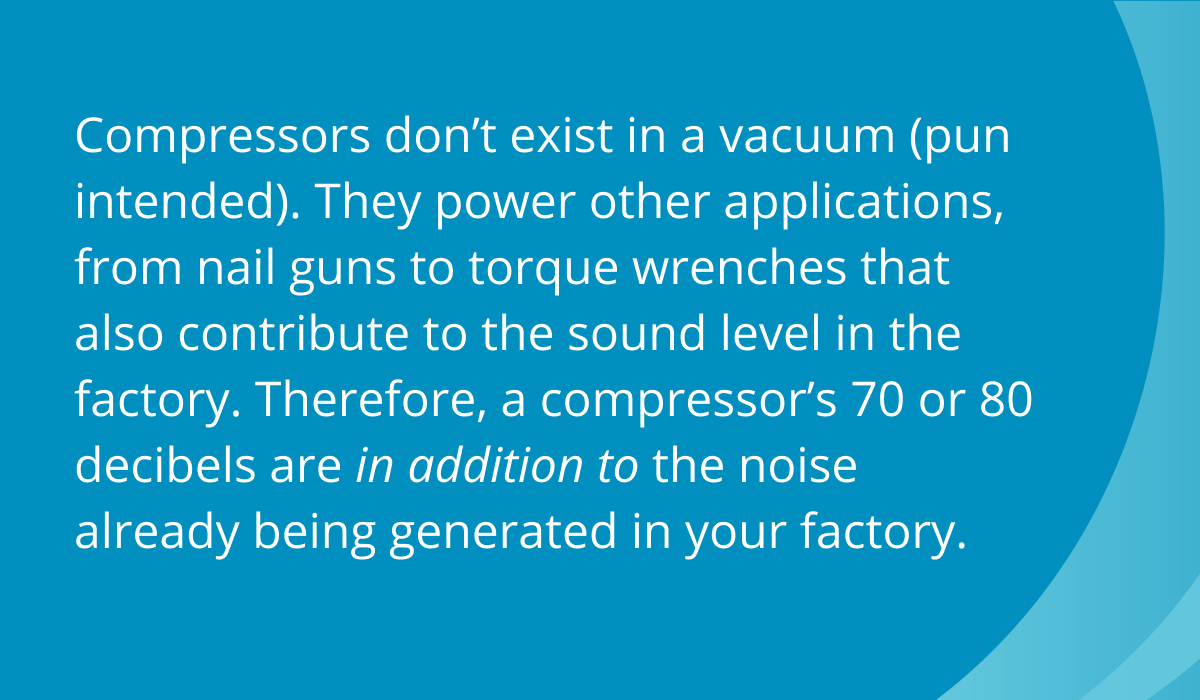
So, compressor manufacturers must do their part.
What We Do
Kaishan prides itself on its quiet air compressors, many with sound levels as low as 70 dB.
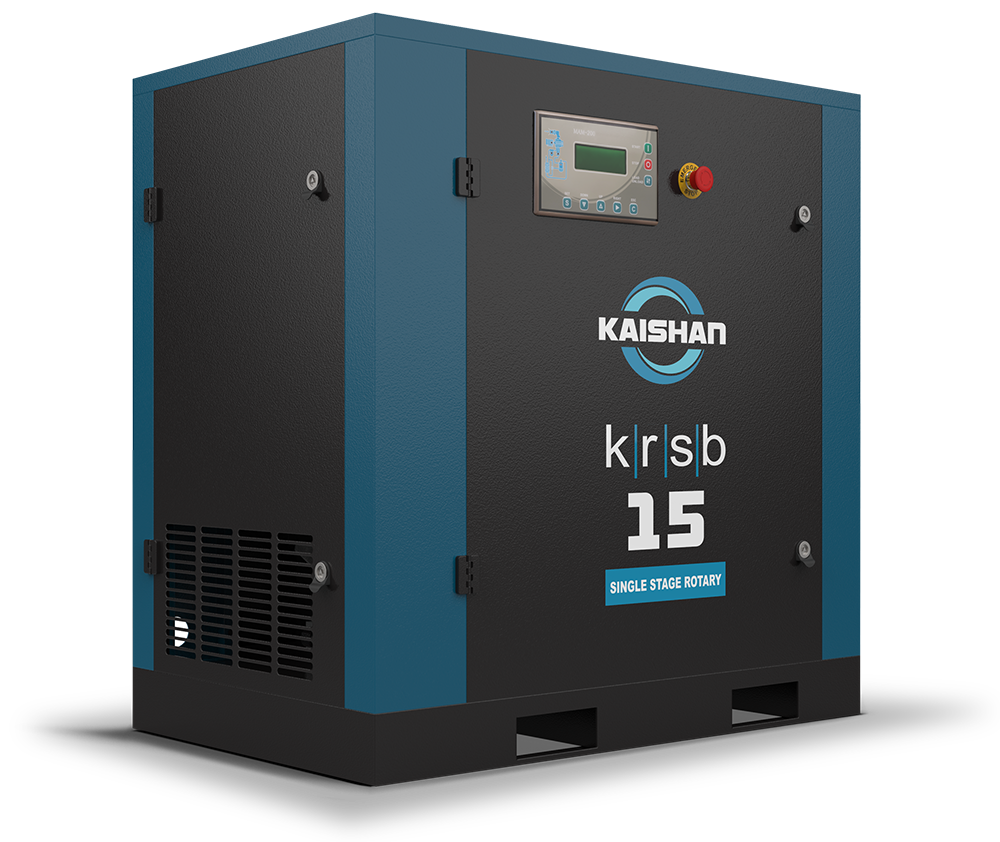
Our Kaishan KRSB belt-drive compressor has a 70 dB sound rating and provides excellent performance at an affordable price.
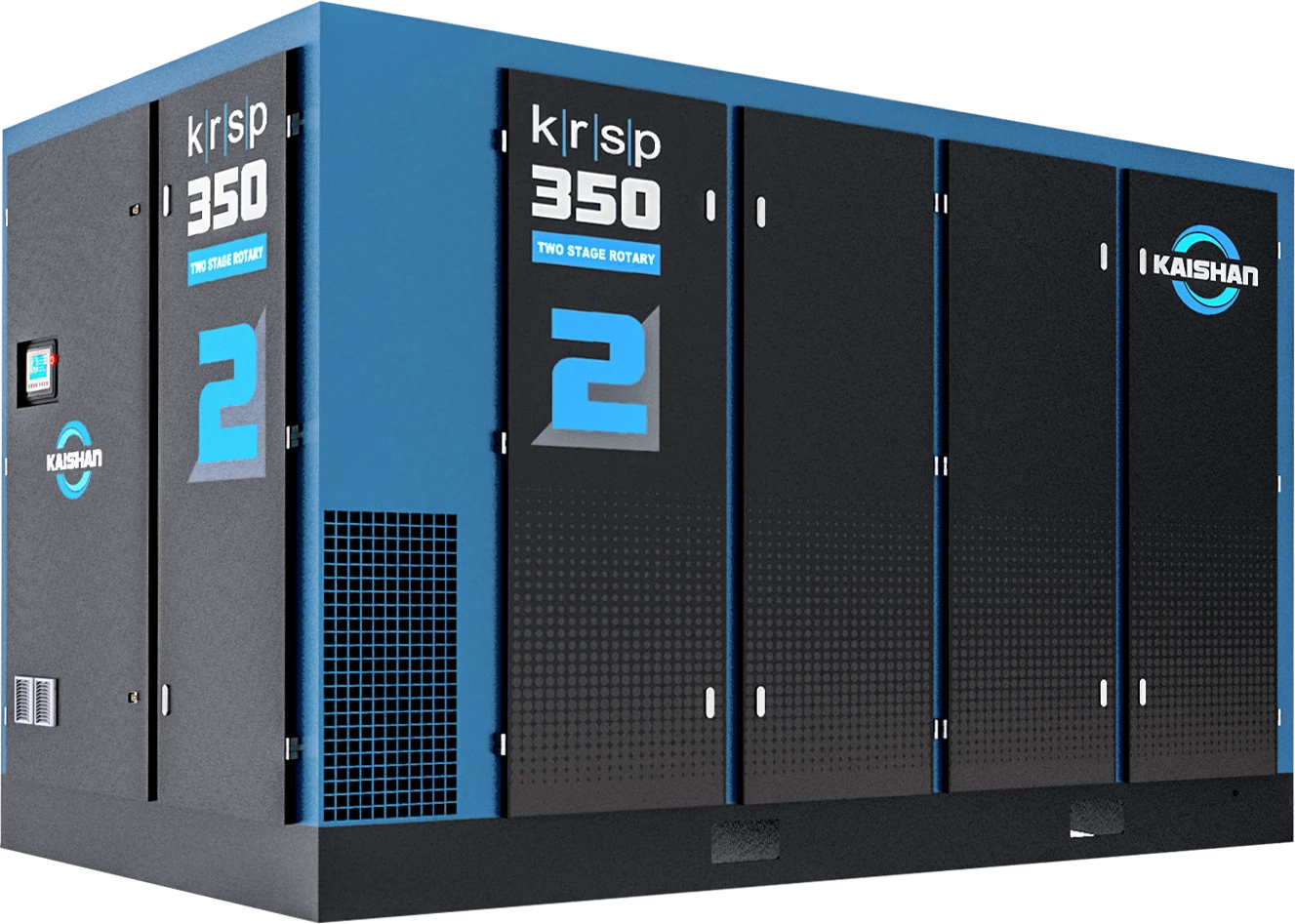
Our Kaishan KRSP2 premium variable-speed, two-stage rotary screw air compressor has a 70 dB sound rating and provides a high level of efficiency combined with world-class reliability.
We have taken several steps to drive down the sound levels in our compressors, including:
- Vibration isolators below the airends and motors
- Sound-deadening enclosures over the motor, pump and fan
- Enclosures and housings with thicker gauges of steel or aluminum than our competitors
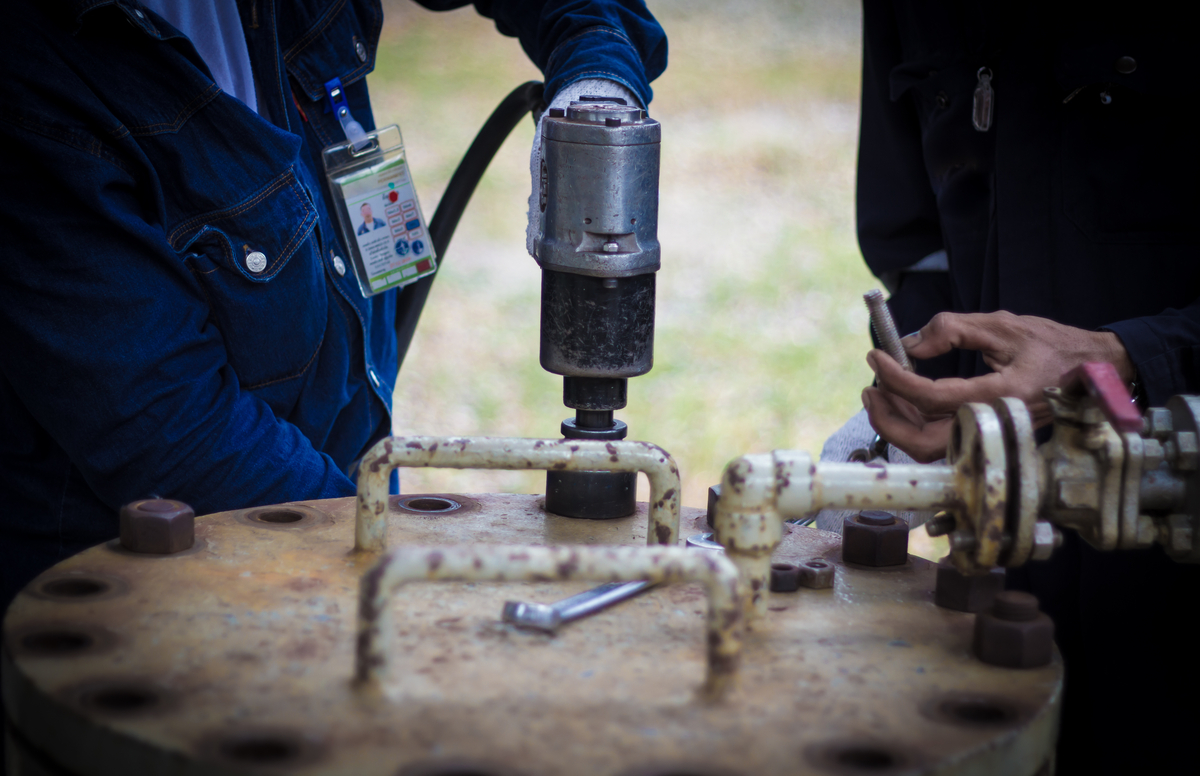
Admittedly, compressors are not the only equipment generating noise in a typical factory. The tools that your air compressor powers also contribute to the sound level.
In addition, we test every compressor before it leaves the factory to make sure it will operate at the lowest possible sound level. All compressors are tested in a "free-field" environment or sound-attenuating booth so there are no reflective surfaces for the noise to bounce off. So, a compressor rated at 70 decibels from the factory may sound louder if installed in an area where the sound reflects off adjacent walls or other equipment.
Action Plan
We strongly recommend the following action plan for controlling noise pollution in your facility:
- Hearing protection. Make sure all equipment operators working near a compressed air system have appropriate hearing protection.
- Location. If possible, move air compressors away from the areas where workers are close by.
- Sound-dampening materials. Make sure you enclose your compressor in an enclosure or housing that will limit sound transmission.
- Flooring. Some companies place rubber isolation pads under their compressors.
The best advice, however, is to start with the right compressor.
Choosing the Right Compressor
Two important considerations determine how much noise a compressor will generate—power source and compressor type.
Power Source
Because they use an engine to accomplish their tasks, gas or diesel compressors generate much more noise than those driven by electric motors. All Kaishan compressors are electrically powered.
Compressor Type
Because they have fewer moving parts and the rotors don’t touch, rotary screw compressors are much quieter than other types, especially reciprocating models.
In fact, Kaishan gets many referrals from current users of reciprocating compressors, which are notorious for their sound levels. Kaishan customers who specifically called out the lower sound levels of our machines included Factory Finish Smart Repair, Hubbard Feeds, Strategic Materials and Custom Thermoelectric.
Another machine similar in noise level is the scroll compressor, which also has fewer moving parts. However, scrolls are limited in capacity and not appropriate for most industrial applications.
A Sound Investment
Few steps can make life easier for your workers than reducing the noise level on the shop floor. A quieter workplace is more comfortable and less stressful. Safer and more productive. It’s easier for workers to communicate and concentrate on their doing their jobs.
If you need help lowering the boom on your factory-floor sound levels, we can help. We work with a nationwide network of independent distributors, who can provide on-site help and consultation as needed to find the right combination of equipment, locations and processes to quiet things down. These factory-trained air compression experts can also service your air compressor system without a problem.
Key Takeaways
- Sound has always been an issue with compressed air, with some types of compressors, notably reciprocating compressors, being notoriously noisy.
- Noise in the workplace can cause many problems for employees, including hearing loss, stress, reduced job satisfaction and poor communication.
- For businesses, high sound levels cause productivity declines, regulatory issues and liability. Plus, they may indicate a mechanical problem in your equipment.
- Regulatory agencies have established the Recommended Exposure Limit for noise at 85 dB for NIOSH and 90 dB in an eight-hour shift for OSHA.
- To reduce noise levels in our compressors, Kaishan has added vibration isolators, sound-deadening enclosures and thicker enclosures and housings.
- An action plan to limit noise should include hearing protection, sound-dampening materials, rubber isolation pads and locating compressors as far from workers as possible.
Let Us Help
Air compressor noise reduction can create a more comfortable working environment and can also have significant bottom-line benefits for your business. If you need help finding the right solution for your facility, get in touch with the experts at Kaishan. Contact us today.
Random stat or
customer quote
textXXtext
text

